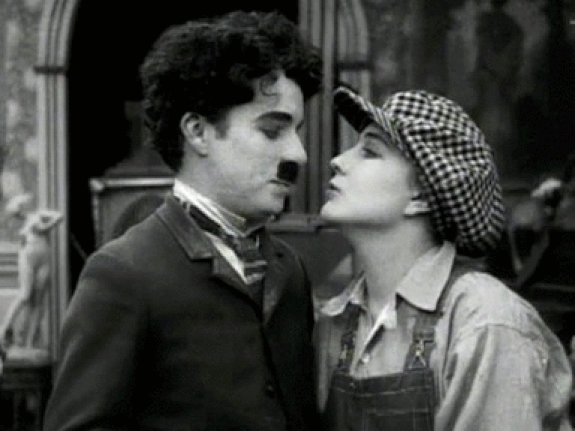In early 1915, Charlie Chaplin was looking for a leading lady for his next film A Night Out, when one of his employees saw Edna Purviance at a café, thinking she might be suited for the role. At the time Edna was working as a secretary and had no previous acting experience. Enthralled by her beauty and charm, Chaplin hired Edna, which was the start of a long working relationship. Edna would appear as Chaplin's leading lady and often romantic interest in 33 of his films, all of them shorts except for The Kid (1921) and A Woman of Paris (1923). In the latter film she had her first and only leading role and it was Chaplin's attempt to launch her career as a dramatic actress. Sadly, the attempt was unsuccessful and after two more films —the unreleased A Woman of the Sea and a French film Éducation de Prince (1927)— Edna's film career was over. (While several sources, including Wikipedia and IMDB, state that the actress made uncredited appearances in Chaplin's Monsieur Verdoux (1947) and Limelight (1952), apparently she doesn't appear in those films at all; read more here.)
.jpg) |
| Above: Edna Purviance and Charlie Chaplin pictured together off-screen. Below: Edna and Charlie in (left) The Immigrant (1917) and A Dog's Life (1918). |
During the casting of Monsieur Verdoux, I had thought of Edna for the important part of Madame Grosnay. I had not seen her for twenty years, for she never came to the studio because her weekly cheque was mailed to her by the office. She confessed afterwards that when she received a call from the studio she was more shocked than thrilled.
When Edna arrived, Rolly, the cameraman, came into my dressing-room. He, too, had not seen her in twenty years. ‘She’s here,’ he said, his eyes glistening. ‘Of course, she’s not the same – but she looks great!’ He told me that she was waiting on the lawn, outside her dressing-room.
I wanted no emotional reunion scene, so I assumed a matter-of-fact manner as if it had been only a few weeks since I last saw her. ‘Well! Well! We’ve eventually got round to you,’ I said cheerily.
In the sunlight I noticed that her lip trembled as she smiled; then I plunged into the reason why I had called her, and told her about the film. ‘It sounds wonderful,’ she said – Edna was always an enthusiast.
She read for the part and was not bad; but all the while her presence affected me with a depressing nostalgia, for she was associated with my early successes – those days when everything was the future!
Edna threw herself into the role, but it was fruitless – the part required European sophistication, which Edna never had – and after working with her three or four days I was forced to admit that she was unsuitable. Edna herself was more relieved than disappointed. I did not see or hear from her again until she wrote to me in Switzerland to acknowledge her severance pay:
Dear Charlie,
For the first time I am able to write my thanks for your friendship down the years, and for all you have done for me. In early life we do not seem to have so many troubles and I know you have had your share. I trust your cup of happiness is full with a charming wife and family.…
[Here she described her illness and the terrific expense of doctors and nurses, but she finished as she always did with a joke:]
Just a story I heard. A chap was sealed in a rocket ship and shot upwards to see how high he could go – was told to keep track of the altitude. So he kept counting 25,000 – 30,000 – 100,000 – 500,000… When he got this far he said ‘Jesus Christ!’ to himself, and a very silent soft voice answered back: ‘Yessss –?’
Please, please, Charlie, let me hear something from you in the near future. And please come back, you belong here.
Sincerely your truest and best admirer,
Love, Edna.
Through all the years I had never written a letter to Edna; I always communicated with her through the studio. Her last letter was an acknowledgement of the news that she was still on the payroll:
November 13th, 1956.
Dear Charlie,
Here I am again with a heart full of thanks, and back in hospital (Cedars of Lebanon), taking cobalt X-ray treatment on my neck. There cannot be a hell hereafter! It all comes while one can wriggle even a little finger. However, it is the best known treatment for what ails me. Hope to be going home at the end of the week, then can be an outside patient (how wonderful!). Am thankful my innards are O.K., this is purely and simply local, so they say – all of which reminds me of the fellow standing on the corner of Seventh and Broadway tearing up little bits of paper, throwing them to the four winds. A cop comes along and asks him, what was the big idea. He answers: ‘Just keeping elephants away.’ The cop says: ‘There aren’t any elephants in this district.’ The fellow answers: ‘Well, it works, doesn’t it?’ This is my silly for the day, so forgive me.
Hope you and the family are well and enjoying everything you have worked for.
Love always, Edna.
Shortly after I received this letter she died. And so the world grows young. And youth takes over. And we who have lived a little longer become a little more estranged as we journey on our way.
Source: Charles Chaplin: My Autobiography (1964)
 |
| Charlie en Edna in Behind the Screen (1916) |

.jpg)
No comments:
Post a Comment